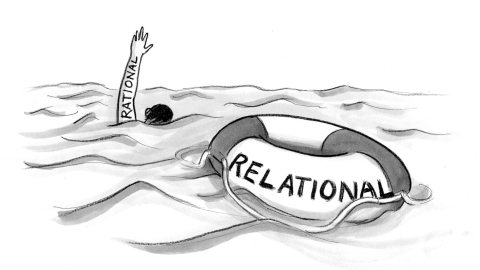Do We Need To Rescue Rationality?

The word “rational” needs rescue and realignment. Or we’ll fail evolution’s “negative telos” test. As Tom Stoppard’s play The Hard Problem shows, a key rational parable is widely misinterpreted.
1. Spike (a character representing “all the science that’s taught”) says to Hilary (a scientist who prays) that “altruism is always self-interest,” and “Darwin doesn’t do sentimental.”
2. Real-life scientist David Sloan Wilson disagrees. Wilson tells Stoppard (here) that Spike is wrong. Doing good can be rational and “altruism and morality” are explainable by evolution, and its games.
3. Darwin believed sentiments had evolutionary roles: “social instincts … naturally lead to the golden rule”; anyone lacking social instincts was an “unnatural monster.” Indeed “Darwin was no Darwinian.”
4. Hilary and Spike discuss game theory and its celebrated Prisoner’s Dilemma: a two-player game with two options, cooperate or defect, and payoffs ranked Temptation > Reward > Punishment > Sucker. If the players cooperate, both get Reward. If only one defects, he gets Temptation, the other gets Sucker. If both defect, both get Punishment.
5. Spike’s conventional view says the other player “rationally” tempted, will defect. So you should “rationally” defect also. But this “rationality” guarantees poor results. Hilary posits other motives: Player A loves Player B, so sacrificing has a sentimental logic.
6. Evolution is smarter than Spike’s “rationalists.” Hilary’s and Darwin’s sentimental logic can beat selfishness. For example: Christians would beat “rationalists” in Prisoner’s Dilemmas. Like any Golden Ruled players, they’d cooperate. When we call foreseeably worse strategies “rational,” something’s broken.
7. Hilary says, “You can’t get an ought out of an is. Morality is not science.” She’s wrong. Some oughts are necessary for any is, to survive. Life needs no “telos” (grand purpose) to have a kind of “negative telos.” Nature and logic eliminate behaviors that damage what they depend on. This unnamed principle (needism?) governs evolution.
8. Game theory provides “behavioral telescopes” to scientifically study moral rules. Humans, being social and self-deficient, can’t thrive without rules. Certain rules work better. These long-term patterns are objectively assessable. Evolution is itself a game theorist, testing “endless forms [and strategies] most beautiful.”
9. In Prisoner’s Dilemmas, Jewish norms beat Christian ones. Its best strategy, Tit-For-Tat (use the other player’s last move on them) beats Christian “turning the other cheek,” which is exploitable (as Machiavelli and Nietzsche complained). But Old Testament “an eye for an eye” becomes Tit-For-Tat, if forgiveness follows punishment. Divine or not, forgiveness can be adaptive.
10. A “Golden Punishment Rule” enables sustainable cooperation by preventing profitable cheating. Punishment must equal or exceed ill-gotten gains. That’s why Wilson is wrong to say, “Selfishness beats altruism within groups.” Social punishment (moral sanction) exerts selective pressures on within-group strategies as powerfully as any predator.
11. Our survival games are much easier than Prisoner’s Dilemmas. Only fools play with known bad cooperators (see Christopher Boehm’s Moral Origins).
The stage is set for us to rescue “rationality.” We ought never to call “rational” self-maximization that’s foreseeably collectively self-destructive (in economics, or politics). Only “relational rationality” really makes sense.
Illustration by Julia Suits, The New Yorker Cartoonist & author of The Extraordinary Catalog of Peculiar Inventions.





